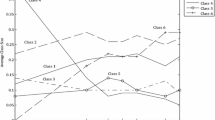Abstract
Using a large dataset of automobile transaction prices, we find that offline African-American and Hispanic consumers pay approximately 2% more than do other offline consumers; however, we can explain 65% of this price premium with differences in observable traits such as income, education, and search costs. Our estimates of unexplained race premia are smaller than previous estimates in the literature. Online, we find that minority buyers pay nearly the same prices as do whites controlling for consumers' income, education, and neighborhood characteristics. These results are consistent with the Internet facilitating information search and removing cues to a consumer's willingness to pay. Our results imply that the Internet is particularly beneficial to those whose characteristics disadvantage them in negotiating.
Similar content being viewed by others
References
Admati, A.R. and M. Perry. (1987). “Strategic Delay in Bargaining”, Review of Economic Studies 54(3), 345-364.
Ayres, I. (2002). Pervasive Prejudice? Chicago, IL: University of Chicago Press.
Ayres, I. and P. Siegelman. (1995). “Race and Gender Discrimination in Bargaining for a New Car”, American Economic Review 85(3), 304-321.
Goldberg, P.K. (1996). “Dealer Price Discrimination in New Car Purchases: Evidence from the Consumer Expenditure Survey”, Journal-of-Political-Economy 104(3), 622-654.
Hylton, K.N. and V.D. Rougeau. (1996). “Lending Discrimination: Economic Theory, Econometric Evidence, and the Community Reinvestment Act”, The Georgetown Law Journal 85(2), 237-294.
J.D. Power and Associates. (2000a). Dealer Satisfaction with Online Buying Services. Management report, Agoura Hills, California.
J.D. Power and Associates. (2000b). New Autoshopper.com Study. Management report, Agoura Hills, California.
J.D. Power and Associates. (2001). Initial Quality Study. Management report, Agoura Hills, California.
Mannering, F. and C. Winston. (1991). “Brand Loyalty and the Decline of American Automobile Firms”, Brookings Papers on Economic Activity, Microeconomics pp. 67-103.
Salop, S. and J. Stiglitz. (1977). “Bargains and Ripoffs: AModel of Monopolistically Competitive Price Dispersion”, Review of Economic Studies 44(3), 493-507.
Scott Morton, F., F. Zettelmeyer, and J. Silva-Risso. (2001). ''Internet Car Retailing'', Journal of Industrial Economics 49(4), 501-520.
Zettelmeyer, F., F. Scott Morton, and J. Silva-Risso. (2003). “Cowboys or Cowards: Why are Internet car prices lower?”. Working paper, University of California at Berkeley, Berkeley, CA.
Author information
Authors and Affiliations
Corresponding author
Rights and permissions
About this article
Cite this article
Morton, F.S., Zettelmeyer, F. & Silva-Risso, J. Consumer Information and Discrimination: Does the Internet Affect the Pricing of New Cars to Women and Minorities?. Quantitative Marketing and Economics 1, 65–92 (2003). https://doi.org/10.1023/A:1023529910567
Issue Date:
DOI: https://doi.org/10.1023/A:1023529910567




